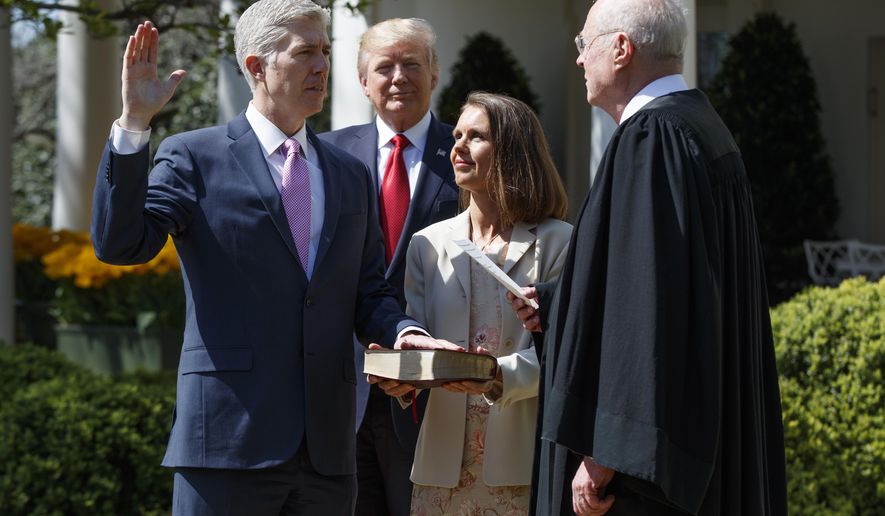Republicans won the fight to confirm Justice Neil M. Gorsuch to the Supreme Court and Democrats lost — but both sides walked away happy with how their leaders performed on Capitol Hill, and said they’re ready for the next vacancy.
“I’m already planning for another opening. I’m ready for round two and a potential round three and all of the lower judicial courts,” said Mark Lucas, executive director of Concerned Veterans for America, which was part of the conservative backing for Justice Gorsuch. “We’re ready to engage in other multiple confirmations if those openings do occur.”
Republicans, led by Sen. Mitch McConnell of Kentucky, had kept the Supreme Court seat vacant for almost all of 2016, refusing to act on President Obama’s nomination of Judge Merrick Garland and instead saying the winner of the election should make the pick.
That meant President Trump began his term with a Supreme Court battle, sparking a major fight on Capitol Hill that saw Democrats mount a filibuster and Republicans use the “nuclear option” to change the rules, curtail the power of the filibuster and install Justice Gorsuch on the court.
Conservative groups said Mr. McConnell handled the fight well throughout.
“If you combine what he did on Garland with his support of the ’nuclear option,’ and his disinterest in finding some compromise to avoid the ’nuclear option,’ his standing now with conservatives is very high,” said Curt Levey, president of the Committee for Justice.
Mr. McConnell also won unanimous support from Republicans for the nuclear option — something the GOP wasn’t able to do when it first contemplated the strategy in 2005. But it was Democrats who pulled the trigger in 2013 to bar the use of the filibuster in every other case of presidential appointments, whether to the lower federal courts or the executive branch.
“Keeping the Republican senators in line is no small feat, and he accomplished that with one of the most significant issues even for someone with such a long and storied career as his,” said Carrie Severino, chief counsel at the Judicial Crisis Network. “This is probably one of the most significant things he will have accomplished.”
Liberal groups, though, were just as happy with Minority Leader Charles E. Schumer of New York and Sen. Dianne Feinstein of California, the Judiciary Committee’s ranking Democrat, who managed to rally their party to filibuster the Gorsuch pick, forcing the rules change.
“I have to give an enormous, enormous amount of respect to Sen. Schumer, to ranking member Feinstein — to really the almost the entire caucus — they made clear they were on the side of the American people,” said Daniel Goldberg, legal director at the progressive Alliance for Justice.
The liberal groups applied intense pressure on rank-and-file Democrats, demanding they force the nuclear showdown this year. Some Democrats had wanted to preserve the filibuster option for a future nominee, saying Judge Gorsuch — who will fill the seat of the late Justice Antonin Scalia — wasn’t worth the fight because he won’t tip the court balance.
Mr. Levey said the liberal groups weren’t strategically successful, despite proving they can capture the ear of Democrats in Congress.
“I think the proof is they got the Democratic senators to do something, which is otherwise irrational,” he said. “I guess if you get somebody to jump off a cliff, that’s a lot of influence right there.”
The effects of the rules change will be felt over the course of future nominations to the high court, now that the prospect of a partisan filibuster is off the table.
Marge Baker, executive vice president of People For the American Way, said she hopes the groundwork her organization did — including airing ads in six states — helped liberals realize the importance of the Supreme Court. She said she hopes that will carry over to the next nomination fight.
Ms. Baker also said Republicans didn’t have to trigger the “nuclear option,” and said the fact that they did was “lawlessness.”
“It may have some short term successes, but it doesn’t prevail in the end,” she said.
• Alex Swoyer can be reached at aswoyer@washingtontimes.com.




Please read our comment policy before commenting.